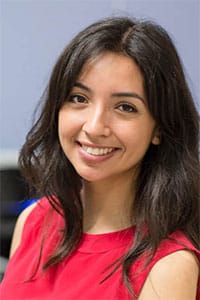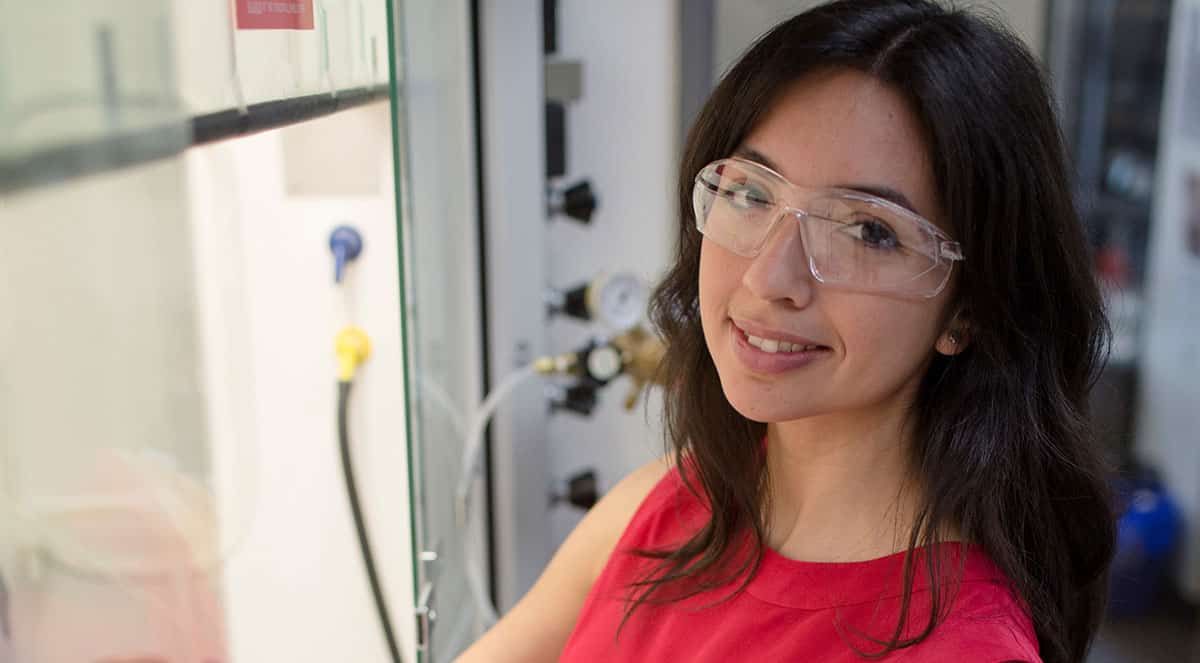Anji Trujillo’s first introduction to analytical chemistry came as an undergraduate at Humboldt State University, where she helped build a device to measure how ancient redwood forests surrounding the northern California campus influence air quality.
It was the beginning of an odyssey that would lead Trujillo to a 2021 Chemistry Ph.D. from UW–Madison, a vast working knowledge of mass spectrometry, and a coveted job working on the front lines of drug development at Pfizer in St. Louis.
Trujillo worked in the lab of UW–Madison and Morgridge investigator Josh Coon, who uses mass spectrometry to explore a wide range of biological and medical questions. Mass spec is one of the essential tools of modern biochemistry, helping scientists precisely measure the mass of different molecules in a sample. Rather than study the atmosphere, Trujillo analyzed molecular compounds that yield clues on everything from Alzheimer’s and Parkinson’s disease to the COVID-19 virus.

Today, Trujillo is about six months into a job as senior scientist at Pfizer’s Chesterfield, Mo., facility, which is ground zero for the company’s massive mRNA vaccine rollout to fight the COVID-19 pandemic. She says her facility manufactures the very first step of the vaccine process — the development of DNA templates — and ensures safety testing of vaccine doses. All told, the facility has had a hand in producing nearly 3 billion vaccine doses.
“It’s a very exciting time to be here,” Trujillo says. “We celebrate together not just from the vaccine point of view, but all of the other drugs that are in the pipeline. We are constantly getting messages of gratitude from Pfizer leaders, highlighting the dedication and hard work Pfizer colleagues put towards the science that enables the delivery of drugs to patients around the world. For the COVID-19 efforts, it is privilege and an honor to get an insight into the clinical trials — if it involves pediatrics , or the COVID anti-viral pill (PAXLOVID) – I am part of the team that ensures the highest quality and efficacy during the developmental and manufacturing stages. I get to see the breakthrough moments, courage, and excellence that permeates at Pfizer and this is extremely motivating.”
While in the Coon Lab, Trujillo worked more on the analytical side of mass spec, collecting the widest possible breadth of different molecules from different conditions to develop a composite picture of the biology. At Pfizer, she focuses more on characterization of the structures and properties of the drugs being developed by the company.
Trujillo, a first-generation college student, grew up in Santa Barbara, Cal., where her parents immigrated from Mexico when they were teenagers, seeking a better life. She started her undergraduate work at Santa Barbara Community College, where she fell in love with anything involving chemistry and research. She later transferred to Humboldt State University to complete her bachelor’s degree in chemistry. It was there she got to work with a professor on building a mass spec device to figure out what’s in that pristine air.
“I never got to use it, but it fueled my interest in mass spec, I also realized I was really good with my hands – a skillset that has allowed me to fix and run mass spectrometers” she says.
So, what triggered a move 2,300 miles east from California to the Midwest? For Trujillo, it came through the National Science Foundation’s Research for Undergraduates (REU) program, which connects research-minded juniors with a network of labs around the country. She had five offers but chose UW–Madison, working in the lab of chemical biologist Laura L. Kiessling. It was a big decision, but she accepted the challenge and was open to the new opportunities she couldn’t quiet see ahead.
“I learned that my training and skills were also valuable outside of the lab and I could enrich my graduate experience by giving back to the Madison community.”
Anji Trujillo
“In my head, I thought Madison and saw rolling green hills,” she says. “Let’s go see if that’s exactly what it is.”
The experience was phenomenal, she says, and Kiessling and her graduate students ultimately became instrumental in helping her find the confidence and resources to go to graduate school. “For a first-generation college student, obtaining your bachelor’s degree is typically the ultimate goal. That bachelor’s degree represents the end of a windy and tiring journey. What comes after is a whole other ball game and it requires pivotal moments where you feel like you belong and are capable of embarking on a Ph.D. journey. Laura gave me the chance and experience to believe in myself as a scientist, and her group did an amazing job at helping me feel welcomed and convincing me I could succeed in graduate school,” she says.
Another Wisconsin connection sealed the deal for Trujillo. At a conference her senior year at the Society for the Advancement of Chicanos/Hispanics and Native Americans in Science (SACNAS), one of the speakers was UW–Madison geneticist Ahna Skop, who gave a talk on the connections between science and art.
“I was mesmerized,” she says. “As a Mexican American, art is a huge part of my culture. It elevated for me my idea of what a scientist could be.”
She was accepted to UW–Madison and joined the Coon lab in May 2015. Trujillo says that Madison ended up incorporating all of the things she really wanted in a campus culture.
“I was looking for driven, creative people,” she says, “but who also were down to earth. People you could go have a beer with, or go get ice cream, or go for a walk and talk about science. And to me, it brought together the human part and the science part.”
While at UW–Madison, she also minored in research communication and prepared a research report on how to improve the city bus system. She also contributed to science outreach in the Discovery building in programs like Science Café and Saturday Science. She strongly encourages graduate students to incorporate social and humanistic perspectives into their scientific endeavors, she says, “I learned that my training and skills were also valuable outside of the lab and I could enrich my graduate experience by giving back to the Madison community.”
“In hindsight, I didn’t realize when working in Josh’s group that we were considered national leaders in the mass spec field,” she says. “I didn’t realize the impact until I came to Pfizer and they were talking about me coming from a world-renowned lab. And I’m like, ‘OK, you’re right about that.’”
